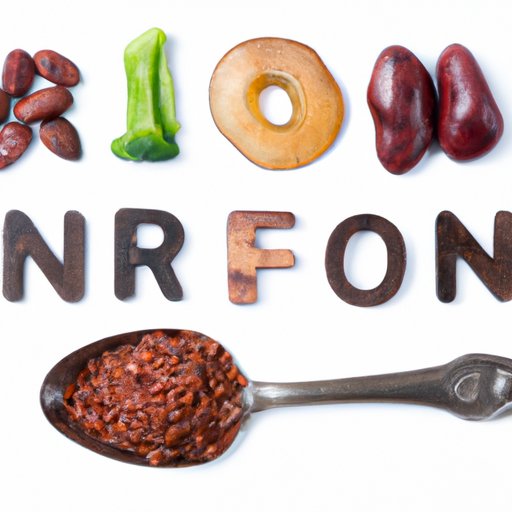
Introduction
Iron is an essential mineral that plays an important role in our daily diet. It helps in the production of red blood cells, boosts our immune system, and aids in cognitive development. In this article, we will discuss the daily intake requirements of iron, food sources rich in iron, and how to pair iron with other nutrients to increase absorption. We will also delve into the symptoms of iron deficiency and whether supplements are necessary.
List Daily Iron Intake Requirements for Different Ages
The recommended daily intake of iron differs for varying age groups and genders. Children from 1-3 years need 7mg/day, while those between the ages of 4-8 require 10mg/day. As for adolescents, both boys and girls ages 14-18 need about 11mg/day. For adults aged 19-50, men require 8mg/day, while women between the ages of 19-50 require 18mg/day (Note: For pregnant women, the recommended amount is 27mg/day). After the age of 50, men only need 8 mg/day, but postmenopausal women still need 8mg/day.
The Importance of Iron in Our Daily Diet
Iron is a mineral needed for various functions in our bodies such as transportation of oxygen and metabolism. Lack of iron intake can lead to anemia, which is a condition that results in fatigue and weakness. Anemia can also lead to a weakened immune system, and studies have shown that it can increase the risk of death. Apart from that, iron is also essential for healthy brain development, as it helps in the production of neurotransmitters.
The Best Sources of Iron for Vegetarians and Non-Vegetarians
The best sources of iron are usually found in animal products such as beef and chicken. Apart from that, chicken liver is also a rich source of iron, with a 100g serving having 9.2mg. However, vegetarians and vegans can also get iron from plant-based sources. Examples include beans, lentils, tofu, spinach, and more. It’s important to note that the body absorbs heme iron (found in animal products) better than non-heme iron (found in plant-based foods). This means vegetarians and vegans need to ensure they get enough iron from non-heme sources and pair with Vitamin C for better absorption.
Combining Iron with Vitamin C for Better Absorption
Vitamin C is important for iron absorption, so pairing it with iron-rich foods is a great way to ensure we get the most out of the iron we consume. Examples of foods that are high in Vitamin C include citrus fruits, tomatoes, and leafy greens. For instance, pairing a spinach salad with citrus fruits such as oranges or grapefruits can boost the iron absorption in our bodies. However, it’s also essential to note that other nutrients, such as caffeine and calcium, can hinder iron absorption, so it’s essential to be mindful of the food combinations we consume.
Iron Supplements: Do You Really Need Them?
In general, it’s recommended to get essential nutrients, including iron, from food sources. However, some individuals may have difficulty meeting their daily iron needs, especially those who follow a vegetarian or vegan diet. Iron supplements can be an alternative to meet daily requirements. It’s important to note that iron supplements can have some side effects such as constipation, nausea and one should always consult a doctor before taking any supplements. Also, iron supplements can interfere with some medications, especially antibiotics or those used to treat thyroid problems. Therefore, it is always best to check with a qualified healthcare provider to avoid any adverse effects.
Symptoms of Iron Deficiency and What to Do About It
Iron deficiency can result from insufficient iron intake, difficulty absorbing iron from foods, or blood loss. Common symptoms include fatigue, weakness, and pallor. If you notice these symptoms, it’s important to consult a doctor to determine the cause of the deficiency. In addition, doctors may recommend changes to your diet combined with supplements to address iron deficiency anemia.
Conclusion
The importance of iron cannot be overstated, as it plays a vital role in many aspects of our health. Incorporating iron-rich foods in our daily diet is key, especially for those who are at risk of developing iron deficiency. Through this article, we have learned about the recommended daily intake for different ages, how to pair iron-rich foods with other nutrients, and when supplements may be recommended. It’s important to pay attention to our iron levels and prioritize our intake to support our overall health and well-being.




